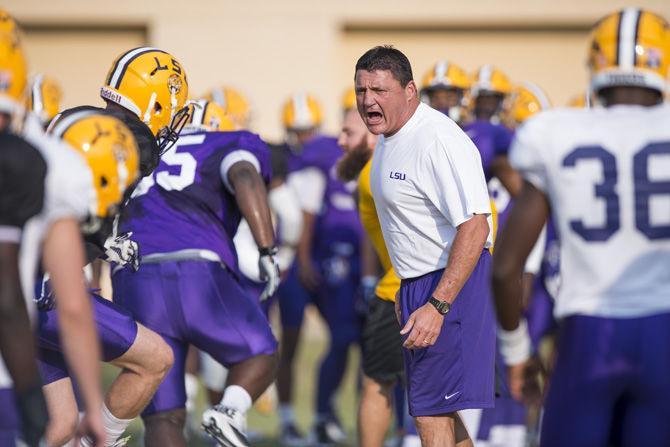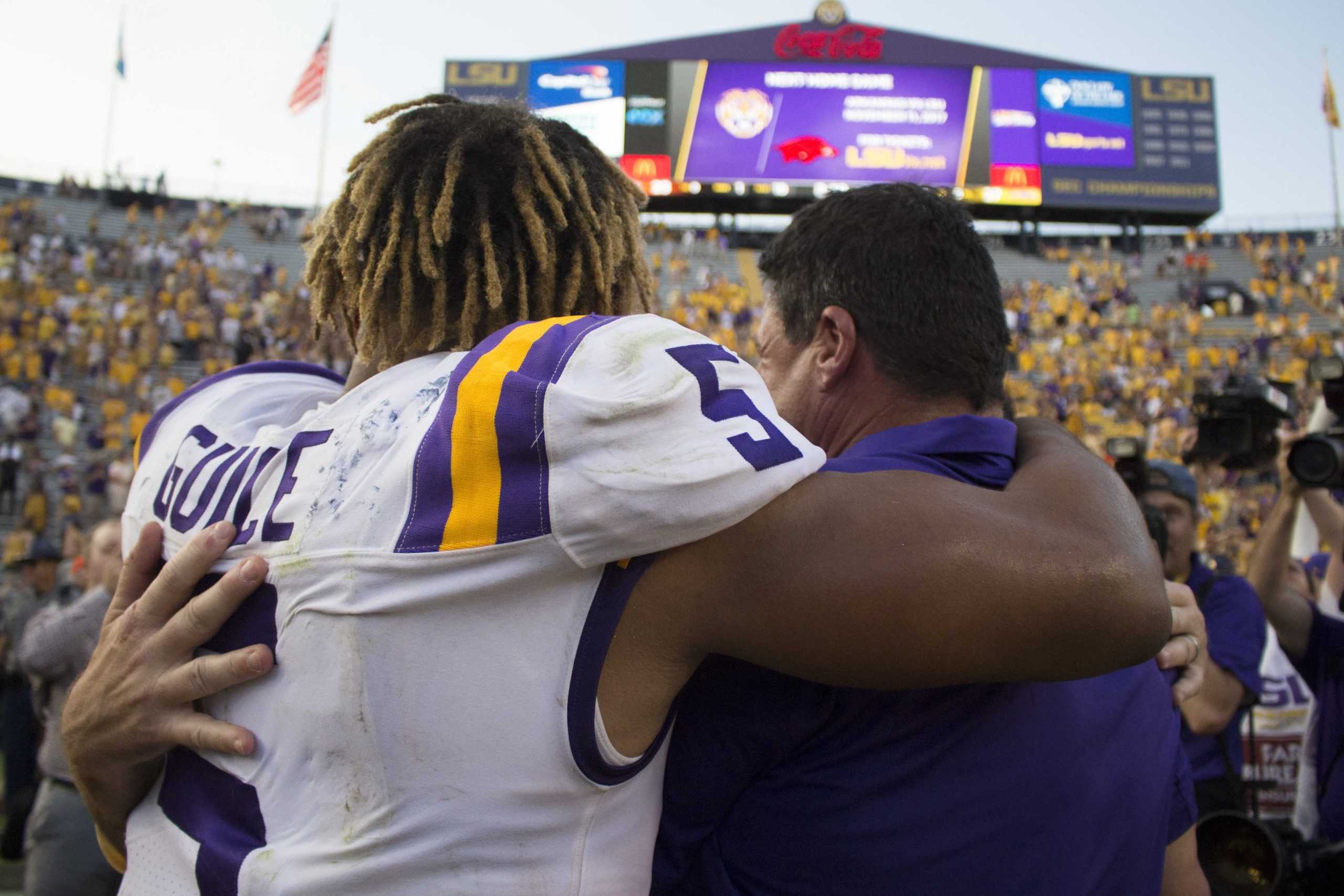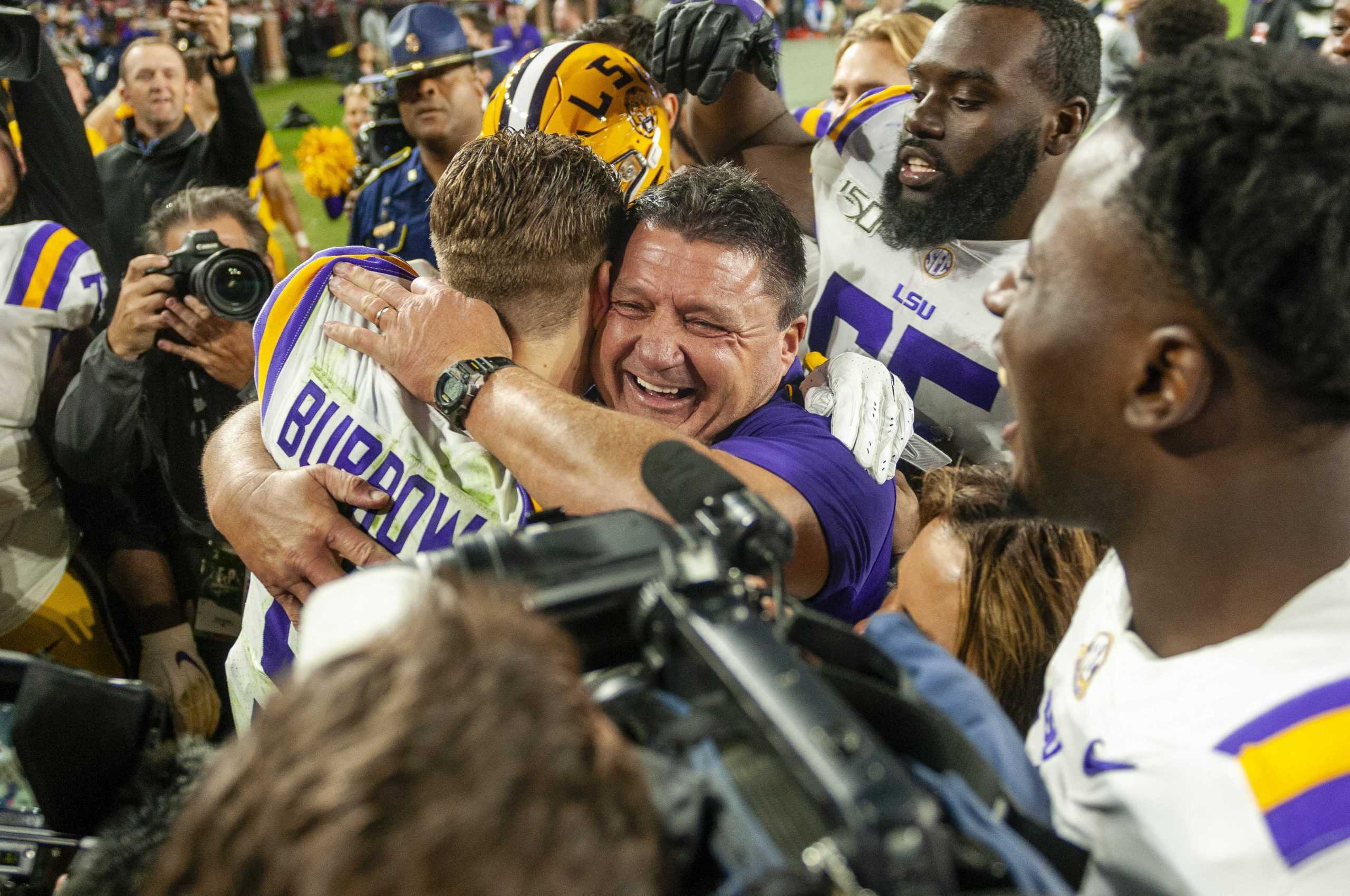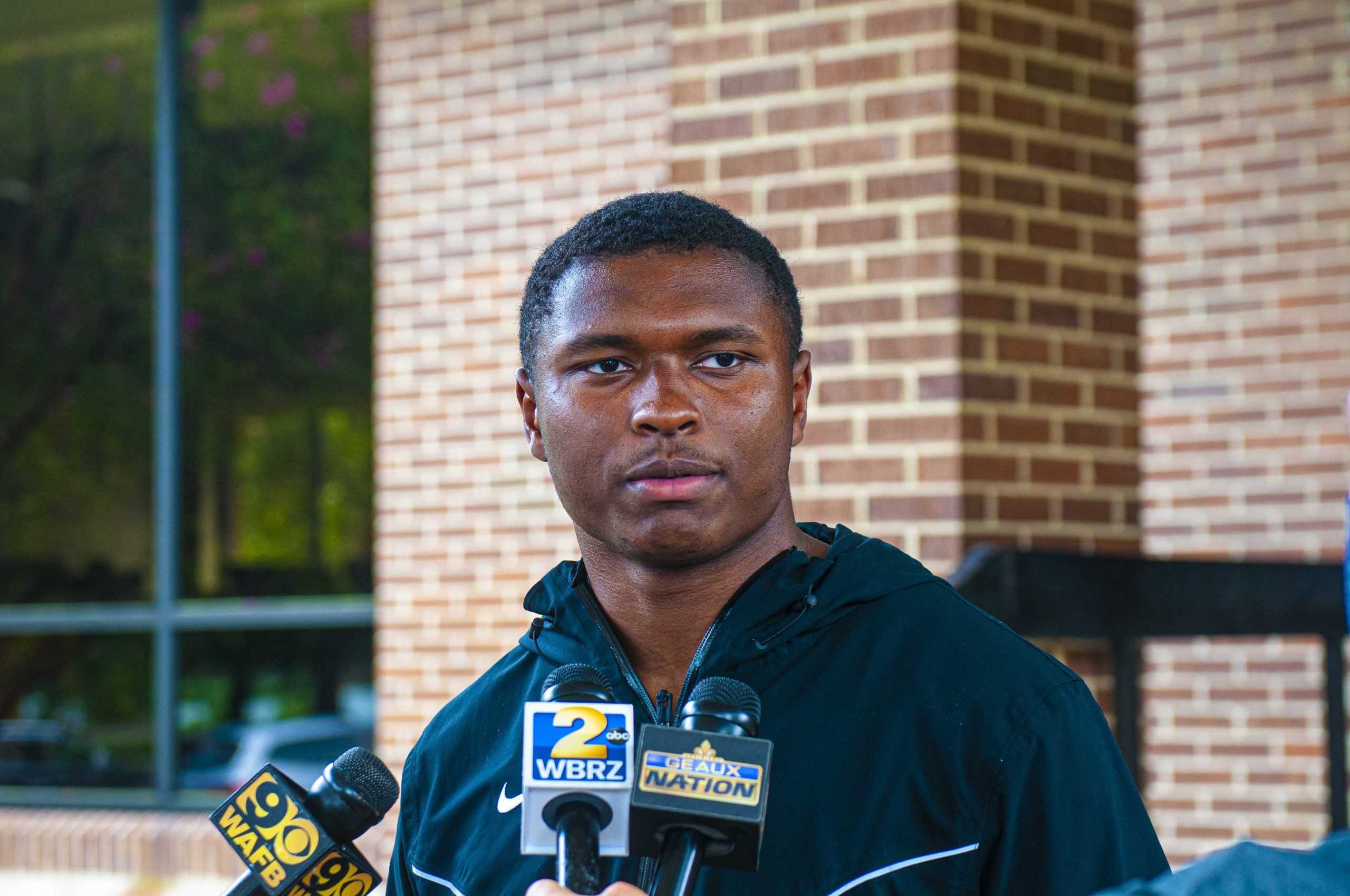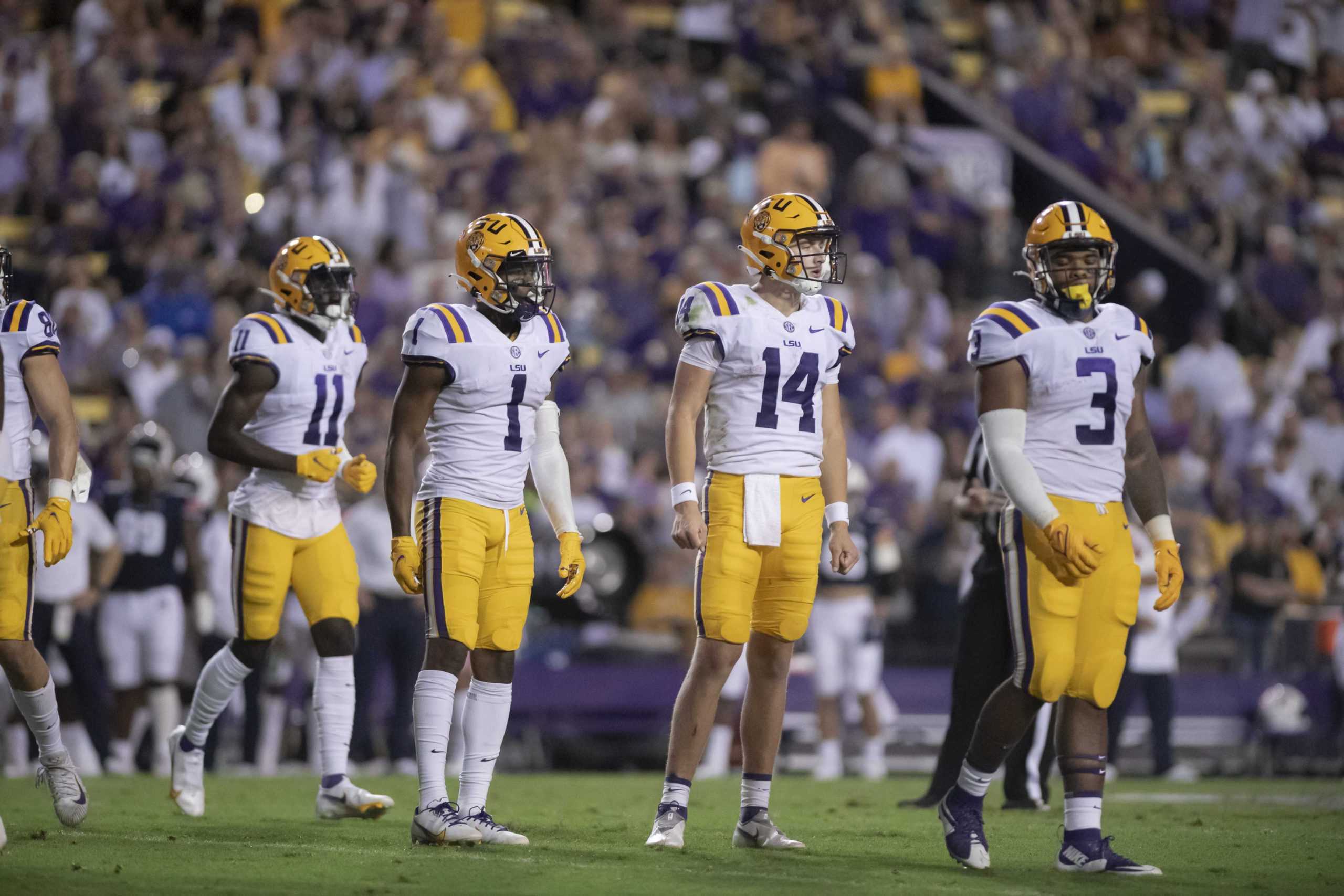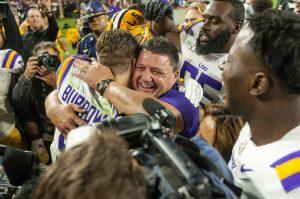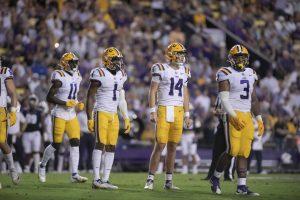Ed Orgeron grinned as he walked toward midfield.
Max Johnson had just taken a knee, pumped his fist and secured a thrilling win over Florida. From the outside, it looked as though LSU and Orgeron were back. In one game, running back Tyrion Davis-Price had exceeded his season rushing total, set a new LSU record and refueled a stagnant LSU offense. The defense had forced four takeaways, despite injuries to six starters.
But in reality, it was already the beginning of the end for the Orgeron era. The fans didn’t know it, the players may not have known it, but Orgeron knew. Athletic Director Scott Woodward had already made his decision: Orgeron will not be LSU football’s coach come 2022. He will finish the 2021 season on a farewell tour, and that will be the end.
“Ultimately, we have very high standards for all of our sports programs at LSU.” Woodward said, “based on our on-field results and our evaluation of the potential for future immediate success, it is time for a new direction.”
The narrative of the Orgeron era at LSU follows a path of achievement, failure then redemption, despite long odds. At first, no one thought Orgeron had a chance to earn the full-time gig: he was the classic interim coach, and nothing more. But he got the job, his team lost to Troy, and then he built back to the top. Orgeron’s team won a national championship two years later.
A dismal two years removed from that championship, Orgeron won’t get another chance to fix it. No matter what happens, LSU will have a new coach in 2022, and a new era will begin.
“I’m happy for our team,” Orgeron said. “I think our team went through a lot this week.”
Orgeron’s LSU career began in 2016 after Les Miles’ unimaginative, archaic offense and clock management mistakes inevitably led to his firing after 12 seasons by Athletic Director Joe Alleva.
His keys were tossed to a barrel-chested, gravel-voiced, Cajun-swamp-man defensive line coach: the right man to breathe life back into a program that had grown stale. This was Ed Orgeron’s dream.
“Growing up in south Louisiana, being the head coach at LSU was a dream,” Orgeron, the Larose native said. “This is the greatest job in America. It’s a great day in my life, I’ll tell you that.”
Orgeron, newly minted as interim head coach, had the support of the players.
“I see us doing great toward the end of the season,” star defensive lineman Arden Key said. “I feel like he will solidify the head coaching spot, and they’re going to give it to him for next year and for years to come.”
Orgeron offered the newly opened job of offensive coordinator to tight ends coach Steve Ensminger, and the offense took off.
The Orgeron era blossomed with two debut games that each broke records for the school, one for most yards collected against an SEC opponent and the other for Orgeron being the first coach to win his first two games by 30 points or more.
Orgeron’s Tigers won six of their eight games and finished 8-4 on the season. They were No. 14 in the final Coaches’ Poll and second in the SEC West.
“There’s a different feeling in the air,” junior tackle K.J. Malone said. “Everybody wants to come together. We love Coach O, and that’s who we’re playing for. We want him to be our coach.”
Not long after, the coach beat out Florida State’s Jimbo Fisher and Houston’s Tom Herman for the job after Alleva learned that he had been wedged in a bidding war with Texas for Herman. Upon finding out, he muttered an expletive, slammed the phone on the coach’s agent and called Orgeron.
Alleva met Orgeron outside the football operations building, where he officially offered Orgeron the job. The husky cajun bear-hugged the athletic director and lifted him off the ground.
“I’ve seen how he’s changed the culture of this football program,” Alleva said. “The attitude of the players. The attitudes of the people in the building. It’s phenomenal.”
“There was no choice, absolutely no choice, but to hire Coach O.”
It wouldn’t take long, however, for the Orgeron era, now fully underway, to take a turn for the worst.
The troubling allegations of sexual misconduct against Orgeron’s best player, Derrius Guice, came to light in spring of 2017, as detailed in an active class action lawsuit against LSU Athletics.
That spring, during Orgeron’s first offseason as head coach, a player reportedly sat down with the coach and told him that a year prior Guice had raped his girlfriend, an LSU student named Ashlyn Robertson, as first reported by USA Today. Orgeron was reportedly dismissive.
“Everybody’s girlfriend sleeps with other people,” the coach allegedly told the player.
Orgeron denied that statement publicly, and privately to Husch Blackwell investigators. The story is described in an amended class action lawsuit in which Orgeron is a defendant. The suit names two additional alleged victims of Guice, a former tennis player named Abby Owens and an ex-football operations intern named Calise Richardson.
The following season, Guice appeared in all 11 games. To start the season, LSU shutout BYU and breezed past Chattanooga. But then, the Tigers fell to Mississippi State 37-7, narrowly beat Syracuse at home and then infamously lost to Troy. LSU’s streak of beating non-conference opponents at home was snapped at 49.
“A disappointing performance,” Orgeron said. “We were out coached and out played tonight. That’s the bottom line.”
Orgeron’s unit, however, did not let the loss define their season. They went to the Swamp and beat Florida 17-16. Then, they faced an early 20-point hole at home to No. 10 Auburn, but stormed back to win 27-23.
It was the Tigers’ largest comeback ever in an SEC matchup in Death Valley.
“We were resilient, we kept on playing,” Ogeron said. “I think the difference in the football game was the way our defense came out and shut them out.”
After winning six of their last seven regular season games, LSU earned a Citrus Bowl bid against Notre Dame.
But before the bowl game, LSU athletics fielded yet another complaint against Guice: this one was from 74-year-old Superdome worker Gloria Scott, who said Guice sexually harassed her while she worked a high school football state championship game. Scott called LSU Athletics, demanding to speak to Orgeron and request he suspend Guice from the upcoming bowl game. It is unclear if she ever spoke to Orgeron.
Guice played in the Citrus Bowl nonetheless. LSU lost 21-17, and Guice declared for the NFL draft. In the offseason, Orgeron fired his offensive coordinator Matt Canada after one season and replaced him with Ensminger, who led an explosive offense while Orgeon was interim coach.
“Here’s the deal, it’s tough when you make a mistake,” Orgeron said. “But it’s even tougher not to admit you made a mistake. [Canada’s offense] just wasn’t a good fit. I had to do what I thought was best for the LSU program. So that’s why I did it.”
In the offseason, with a full year under his belt and a new offense in tow, Orgeron went to look for a quarterback. One spring evening, that quest led him to Mike Anderson’s seafood restaurant for a recruiting meeting with a graduate transfer quarterback from Ohio State.
His name was Joe Burrow.
Whatever plagued the first season and a half of Orgeron’s tenure had been solved. He and his staff had successfully recruited Burrow, arguably the greatest player ever to wear purple and gold. In scrounging for his weapons, they identified a few underrated recruits: Justin Jefferson, Clyde Edwards-Helaire and Ja’Marr Chase. He spotted their potential and dug all of it out of them. Orgeron recognized the need to modernize the offense and found Joe Brady, a young whiz kid who changed LSU’s offense forever.
Steve Ensminger was the right play-caller for the offense, as was Dave Aranda for the defense. Though he disagreed with Aranda’s approach (he desperately wanted an attacking 3-4 scheme), Orgeron let the steely defensive guru do his job.
The result: an undefeated season, a Heisman Trophy, a national championship and a six-year contract extension for the old Cajun who led it all.
When the confetti stopped falling and the celebration ended, Orgeron was largely left on an island. Aranda took over as head coach at Baylor, Brady became the Carolina Panthers’ offensive coordinator and only a few starters from the magical team remained.
Orgeron had almost a blank slate and a blank check. He could do whatever he thought necessary to bring LSU into a state of perennial title contention. But with great power, comes great responsibility-and pressure. Once fans and donors had tasted the glory of a national championship, they held Orgeron to a higher standard. Now, he had to live up to that standard and prove himself yet again.
As the Tigers prepared for their 2020 season opener against Mississippi State, Orgeron walked into the football office to find not one player there; they had walked out as part of a nationwide movement of athletes skipping practice to protest racial inequality.
On the heels of a pandemic summer and a renewed, global focus on race following a few high-profile police killings, Orgeron and his players were reportedly on different pages. A number of players felt that their coach had “mishandled” the day of protest, The Advocate reported, and were frustrated that he said he “loves President Trump” earlier that summer on Fox News.
After an hour-long discussion between players and Orgeron about race and police brutality, two of the team’s best players, Ja’Marr Chase and Tyler Shelvin, opted out of the season to prepare for the NFL Draft.
The tension in the locker room carried onto the field.
Orgeron’s defense allowed a Tiger Stadium record 623 passing yards in a crushing 44-34 loss to Mississippi State. LSU traveled to Missouri, where they allowed another 586 yards in a 45-41 loss. Starting quarterback Myles Brennan was injured in the second half and missed the rest of the season.
Auburn beat LSU by 37 points, the largest margin of victory in the history of the series. It was LSU’s worst loss since 1996 and, if not for a late, garbage-time touchdown, it would have been its worst loss to an unranked opponent in the 84-year history of the AP Poll.
LSU’s defense was one of the worst in the country. They frequently miscommunicated in the secondary, lost track of receivers on basic crossing routes and failed to tackle. The blame fell on new defensive coordinator Bo Pelini, who Orgeron later admitted was lazily hired without a formal search or interview.
“I hired some coaches I didn’t even interview for the last staff,” he said, “and I’m never doing that again.”
Thrilling wins over Florida and Ole Miss quieted the critics, and the team ended the season 5-5. But Orgeron still fired Pelini at the end of the season at a $4 million buyout. Ensminger retired, and Orgeron hired two young Joe Brady proteges to run the offense: Jake Peetz and DJ Mangas. After missing out on a couple high-profile candidates, he handed the defense to his third choice, Minnesota Vikings assistant Daronte Jones.
“I think that throughout the season, our team became tougher,” Orgeron said after the Ole Miss win. “Our coaching staff became closer. We continued to fight. Went through a lot of adversity. There were some games we didn’t play very well, but we came back and we fought and we finished strong. That’s what I’ll remember about this team.”
With a young team, a fresh new coaching staff and a better energy throughout the building, Orgeron entered 2021 confident. Before the Tigers’ opener against UCLA, he playfully jeered a heckler.
“Bring your ass on,” he said with a smile, “in your little sissy blue shirt.”
UCLA upset the Tigers. LSU fans flashed back to Mississippi State, as the defense allowed 38 points, 210 rushing yards and huge play after huge play. Orgeron took the blame.
“It’s my responsibility,” he said. “I told that to the team.”
LSU then beat McNeese State, Central Michigan and Mississippi State. They took control early in the game against Auburn, but let the game slip away. The defense could not bring down quarterback Bo Nix, and the offense was out of sync. The Tigers spent five timeouts; four of them were to prevent delay of game calls.
The following Monday, Orgeron made a point to take more of the blame.
“I want to say this first: Ultimately, I’m responsible for the performance of this team,” Orgeron said. “I’ve always been responsible, and I always will be.”
Orgeron then took his team to Lexington, Kentucky, to face the Wildcats. His defense, after showing improvement, collapsed. The offense surprisingly ran the ball well, but the passing attack faltered. They lost 42-21, and Kentucky gathered 329 yards rushing.
Woodward watched the embarrassing performance on the sideline. He saw Wildcat ball carriers slip through LSU defenders. He watched the offense’s futile attempts to mount a comeback. He saw star receiver Kayshon Boutte go down with an injury.
And he made a decision. No matter the outcome of the Florida game, Orgeron would not get another chance. After beating Florida, Orgeron was back where he started five years ago: He’s a placeholder again, while his bosses look for a full-time coach. His message is similar.
“We’re gonna fight,” he said with a smile. “These LSU Tigers are gonna fight.”



